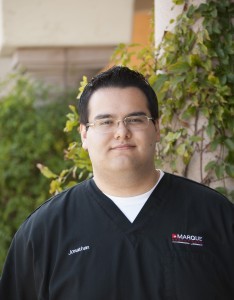A Matter of the Heart by Jonathan Vielma
 The heart is the amazing conductor performing a symphony which is the human body. It is critical to protect such a vital organ since it is the life-giving source. Heart irregularities, chest pain, or pressure are not as rare as some might think. Quite often people fear a heart attack when they start having chest discomfort. However, there are numerous causes for chest pain ranging from harmless to life-threatening. Naturally, the body has many warning signs. Discomfort is a broad warning sign which can often be misinterpreted. Often chest pain or discomfort is not a symptom of a serious issue, but nonetheless any matter pertaining to the heart should not be quickly dismissed. It is important to educate ourselves about our heart.
The heart is the amazing conductor performing a symphony which is the human body. It is critical to protect such a vital organ since it is the life-giving source. Heart irregularities, chest pain, or pressure are not as rare as some might think. Quite often people fear a heart attack when they start having chest discomfort. However, there are numerous causes for chest pain ranging from harmless to life-threatening. Naturally, the body has many warning signs. Discomfort is a broad warning sign which can often be misinterpreted. Often chest pain or discomfort is not a symptom of a serious issue, but nonetheless any matter pertaining to the heart should not be quickly dismissed. It is important to educate ourselves about our heart.
According to the U.S. National Library of Medicine, Medline Plus, the following reasons are the possible causes for chest pain or chest discomfort:
- Angina or a heart attack. The most common symptom is chest pain that may feel like tightness, heavy pressure, squeezing, or crushing pain. The pain may spread to the arm, shoulder, jaw, or back.
- A tear in the wall of the aorta, the large blood vessel that takes blood from the heart to the rest of the body (aortic dissection) causes sudden, severe pain in the chest and upper back.
- Swelling (inflammation) in the sac that surrounds the heart (pericarditis) causes pain in the center part of the chest.
Lung problems that can cause chest pain:
- A blood clot in the lung (pulmonary embolism)
- Collapse of the lung (pneumothorax)
- Pneumonia causes a sharp chest pain that often gets worse when you take a deep breath or cough.
- Swelling of the lining around the lung (pleurisy) can cause chest pain that usually feels sharp, and often gets worse when you take a deep breath or cough
Other causes of chest pain:
- Panic attack, which often occurs with fast breathing
- Inflammation where the ribs join the breast bone or sternum (costochondritis)
- Shingles, which causes sharp, tingling pain on one side that stretches from the chest to the back, and may cause a rash
- Strain of the muscles and tendons between the ribs
Chest pain can also be due to the following digestive system problems:
- Spasms or narrowing of the esophagus (the tube that carries food from the mouth to the stomach)
- Gallstones cause pain that gets worse after a meal (most often a fatty meal)
- Heartburn or gastroesophageal reflux (GERD)
- Stomach ulcer or gastritis (burning pain occurs if your stomach is empty and feels better when you eat food)”
If you experience chest pain or chest discomfort, it is always best to follow up with your doctor as soon as possible. Do not postpone a checkup for reoccurring symptoms. The anxiety of the uncertainty will exacerbate the symptoms and possibly create further complications. Any issue pertaining to the heart should not be taken lightly and it is important to have regular check-ups.
http://www.nlm.nih.gov/medlineplus/ency/article/003079.htm
http://www.webmd.com/heart-disease/tc/chest-pain-topic-overview
The information provided is for general interest only and should not be misconstrued as a diagnosis, prognosis or treatment recommendation. This information does not in any way constitute the practice of medicine, or any other health care profession. Readers are directed to consult their health care provider regarding their specific health situation. Marque Medical is not liable for any action taken by a reader based upon this information.
